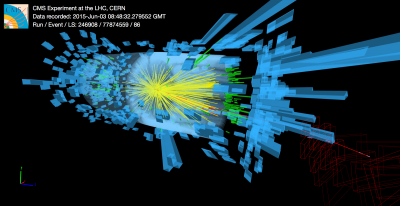Jun 5 2015
The Large Hadron Collider (LHC) at CERN in Switzerland ended a two-year shut down on June 3, 2015. The LHC is now providing collisions to all of its experiments at the unprecedented energy of 13 TeV, almost double the collision energy of its first run. The collider will now run round the clock for the next three years.
 One of the first collisions with "stable beam" at 13 TeV recorded by CMS. Variants below. Courtesy CERN
One of the first collisions with "stable beam" at 13 TeV recorded by CMS. Variants below. Courtesy CERN
University of Minnesota Professors Yuichi Kubota, Jeremiah Mans and Roger Rusack are part of the Compact Muon Solenoid (CMS) experiment at the LHC. “We start a new era in LHC operations: search and discovery in a new energy regime," Rusack said.
The LHC operators declared "stable beams," the signal for the LHC experiments that the colliding beams are stable and that experiments can start to collect data safely. Advanced electronics designed, built and installed by the Minnesota group were used to measure the beam properties as the beams were tuned and to measure the collisions once stable beams were declared.
During the first run of the LHC, the ATLAS and CMS experiments announced the discovery of the so-called Higgs boson, which was the last piece of the puzzle known as the Standard Model, a theory that describes the fundamental particles from which everything visible in the universe is made, along with interactions at work between them.
“The collisions we are seeing today indicate that the work we have done in the past two years to prepare and improve our detector has been successful and marks the beginning of a new era of exploration of the secrets of nature,” said CMS spokesperson Tiziano Camporesi. “We can hardly express our excitement within the collaboration: this is especially true for the youngest colleagues.”